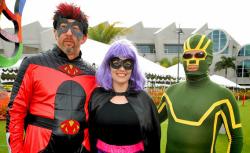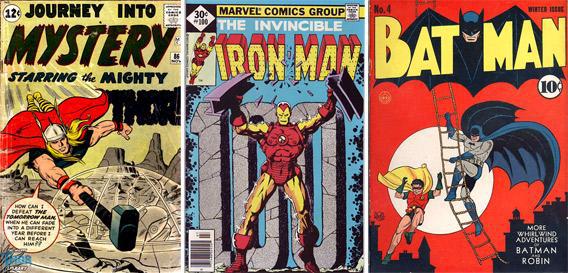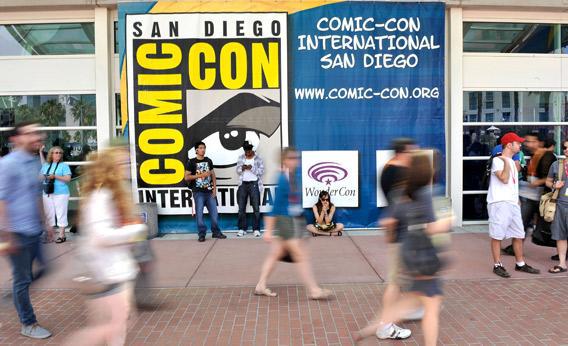My comic books origin story is spotty and uninspiring. In third grade, I’d giggle through Mad magazine from cover to cover, as all precocious third-graders should. I indulged a brief flirtation with the Punisher in middle school—but even my 12-year-old self blanched a little at the empty violence.
I had a close friend in high school who was a full-on comic book geek, forever flipping through copies of Groo and Mai the Psychic Girl. I never caught the bug. Instead, I slaked my thirst for narrative by reading fiction and fed my need for light escapism by following pro sports.

Photograph by Jerod Harris/Getty Images.
As an adult, a few graphic novels have crossed my transom. I loved Pyongyang, about life as an expat in North Korea. I adored Watchmen, a brilliant meta-dissection of our superhero fascination. I enjoyed Y: The Last Man, a high-concept action comedy that posited a world where dudes all die off and women rule the wreckage.
But, like many grown-ups I know, I feel lost when I attempt to comprehend our current, comics-saturated pop culture moment. Consider that, once the box-office tallies are all notched, the biggest movies of this summer will no doubt include The Avengers, The Amazing Spider-Man, and The Dark Knight. That’s a towering, teetering stack of comic book provenance looming over the multiplex. And TV offers no respite: The Walking Dead—an AMC zombiepocalypse show based on a hit comic book series—is among the most-watched dramas in the history of basic cable.
At this point, if called upon, I could recite the key facts: whence Iron Man derives his power, which realm Thor hails from, why Batman is doomed to haunt the night. But not because I’ve ever read (or had any emotional connection to) those comic books. I’ve been indoctrinated, along with everybody else who lives in this era. Comics have won. We can assimilate, or we can lock ourselves out of the dominant cultural conversation.

Marvel Comics, Marvel, and D.C. Comics.
I wonder: How did we arrive at this situation? What does it say about us, good or bad? Will we ever tear off our capes and float back down to solid ground?
To meet America’s inner child, shake his hand, and pose him a few of these questions, I have come to the International Comic-Con in San Diego. Here is ground zero for entertainment in the new millennium. This event, which was a small convention of comics aficionados when it was founded in 1970, now sits at the nexus of comic books, movies, TV, video games, street fashion, and some bizarre role-playing stuff that I don’t understand well enough to categorize (and that frankly scares the bejeezus out of me).
Today, Comic-Con draws more than 130,000 fans. It is a pilgrimage people make when they love pop culture sooooo much that they feel a compulsion to physically touch it—to dress up like it, take pictures with it, and get it to sign a few autographs. Any new entertainment property with mass aspirations must come here to supplicate itself before these fans. They are a vocal minority that wields great power over your diversionary landscape.
I’ve been boning up in hopes of fitting in. Yesterday, I stopped by Secret Headquarters—an upmarket comic book shop in the Silver Lake neighborhood of Los Angeles—and bought current issues of all the hot titles. After riding Amtrak down the coast, leafing through my new comics along the way, I picked up my press badge at the San Diego convention center. Then I spent the afternoon schmoozing with various Comic-Con eminences.
I had lunch with Heidi MacDonald, savoring her final moment of calm before the madness begins. MacDonald is editor-in-chief of the Beat, an essential blog for any comics fan or comics industry player. She’s been writing about comics since 1982, has edited a bunch of them herself, and has been attending Comic-Con for about a quarter-century. She’s far from your defensive fanboy type. She just grooves spiritually with the whole art form. Taking a break from prepping for an upcoming panel with Lynn Johnston (creator of the newspaper strip For Better or for Worse), MacDonald gave me some tips for enjoying the Con. She advised me to check out the 30th anniversary events for Love and Rockets—an alternative comic that is in part about Latina teens in Southern California. Love and Rockets was the reason MacDonald attended her first Con. “I loved that it was a comic about sassy, emotional teenage girls,” she says.
“They draw with the hand of God,” agreed Douglas Wolk, when asked about the Hernandez brothers, creators of Love and Rockets. “And it’s the rare authorial vision that keeps evolving for 30 years. It’s so rewarding for a fan to be able to follow something for that long.” Wolk wrote an extended essay about last year’s Con and is moderating a few panels this year—including one on progressive politics in comics. He lists Judge Dredd as a childhood favorite (don’t be thrown off by the awful Sylvester Stallone film version), citing its take on the American political scene. Among new titles, he pointed me toward The Making Of, a comic by Brecht Evens that uses impressionistic watercolors to capture the scene at a Flemish arts festival. Batman it ain’t. I can’t wait to check it out.
Over at the marina, I visited the 48-foot yacht that is temporary home to Comic Book Resources, an online comics magazine. As I boarded, CBR multimedia host Jonah Weiland was recording an interview with Robert Kirkman, co-creator of The Walking Dead. This wildly successful zombie comic debuted in 2003, but if you’re like me you never heard of it until it became a TV show in 2010. (And although Kirkman is now a legend in the comics universe, about to release Issue 100 of The Walking Dead, he’ll likely never have the fame of a TV auteur like David Simon or Matthew Weiner. Comic books rule the earth, but comic book creators remain in the shadows.)
When Kirkman stepped off the boat, John Layman stepped on. Layman writes Chew, a comic about a detective who receives psychic messages through things he eats—including human flesh. Layman told me that before he made comics, he used to cover the Comic-Con as a journalist for the San Diego Union-Tribune. “Back then, I could see the whole exhibit floor in my lunch hour.”

Photograph by Jerod Harris/Getty Images.
To fully ingest the exhibit floor these days, you’d need to devote most of your weekend to walking its aisles. When the doors opened at 6 p.m. for those with preview privileges, I was part of the herd. A man in a full Batman costume shuffled in front of me. His buddy, in a touchingly intimate gesture, gently lifted Batman’s cape as he stepped off an escalator, so the flowing black velvet wouldn’t get mangled in those metal teeth.
After spending all afternoon attempting to understand comics better, entering the miles-long exhibit floor restored my sense of alienation. I don’t understand the collecting impulse—I have an aversion to both physical media and plastic figurine crap—so that central aspect of the experience left me cold. (I did marvel at the sheer range of collectibles. There were even figurines from A Christmas Story, including one of the dad standing next to his leg lamp.)
What’s more, I didn’t recognize half the entertainment properties represented here. Concepts with massive followings have evidently passed way beneath my radar. “Frankenstein Mobster“? (Just what it sounds like, apparently.) “Axe Cop“? (About a policeman who is armed with an axe.) Someone, please, tell me, what on earth is Kaijudo?
I did chuckle at the odes to Bronies I saw at several booths. And I sort of coveted some of the expertly crafted wooden broadswords on display. But I can tell that my happy place at Comic-Con will be not on the exhibit floor but rather in the panel sessions where people talk about all things comics.
Over the next four days, I will be exploring this foreign territory and reporting back to you. I want to learn what sort of emotional well all this stuff springs from. I want to glimpse the collective comics fan id. I want these gods of my home planet to grant me the superpowers of comprehension, and belonging.